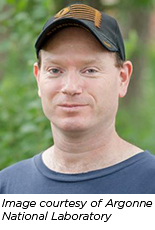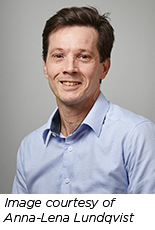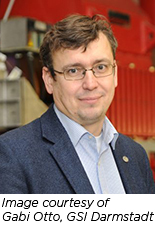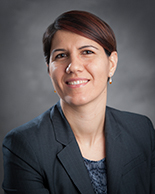Four members of the FRIB user community have been named 2021 Fellows of the American Physical Society (APS): Jason Clark, Christian Forssen, Yury Litvinov, and Artemis Spyrou.
APS is the major professional organization for physicists in the United States. It has over 55,000 members from academia, national laboratories, and industry. The mission of the APS is to advance and diffuse the knowledge of physics for the benefit of humanity, promote physics, and serve the broader physics community.
Fellows are selected for their outstanding contributions to physics. Each year, the number of APS fellows elected is no more than one half of one percent of the membership.
Jason Clark

Clark is a physicist at Argonne National Laboratory. He is also a member of the Joint Institute for Nuclear Astrophysics - Center for the Evolution of the Elements (JINA-CEE) executive committee.
Clark was elected for “high-precision mass measurements critical to the understanding of nucleosynthesis, and for development of improved techniques to enable such measurements.”
“I am humbled and honored to have been selected an APS Fellow,” Clark said.
With a research program spanning from proton-rich light nuclei to the heavy isotopes created in the r-process, Clark said his research in the field of nuclear astrophysics has been essential to understanding the origin of the elements. The state-of-the-art combination of high-precision instrumentation and the newest techniques at ANL’s Argonne Tandem Linac Accelerator System (ATLAS) and Californium Rare Isotope Breeder Upgrade (CARIBU) facilities were the key tools to improving measurements of nuclear masses critical for astrophysics, he explained.
“With FRIB on the horizon, the field can look forward to implementing more of these precision techniques with fast fragmentation beams and measuring the masses of very exotic nuclei for the first time,” Clark said. “There is a lot of excellent work across the nuclear physics community to improve our ability to measure nuclear masses with high precision, and FRIB will certainly play an important role in that effort.”
Christian Forssén

Forssén is a professor in theoretical physics in the division of Subatomic, High Energy and Plasma Physics within the Department of Physics at Chalmers University of Technology in Sweden. He is also a member of the FRIB Theory Alliance.
Forssén was elected for “first-principles calculations of the structure of nuclei, especially near the drip-lines, and for the development of precision nuclear forces through innovative uses of statistical methods.”
“I am very honored that my peers have elected me to join the exclusive company of APS fellows, which indeed includes many international celebrities in physics research,” he said. “Hopefully this will further strengthen our ties with scientists in the United States.”
Forssén said his research is focused on the development of ab initio methods to solve the nuclear many-body problem and statistical methods to construct precision nuclear forces based on effective field theories. He said this framework promises a rather unique opportunity to incorporate the most relevant theoretical uncertainties into our predictions.
“I am excited about prospects to work together with FRIB scientists to statistically confront experiment with theory for properties of atomic nuclei in different regions of the nuclear chart,” Forssén said. “Reliable error quantification can help determine to what extent a disagreement between experiment and theory hints at new physics, and they can provide input to identify the most relevant new experiments.”
Yury Litvinov

Litvinov is a professor and head of the Stored Particles Atomic Physics Research Collaboration (SPARC) Detectors group for FAIR within the Atomic Physics research department at the GSI Helmholtz Center for Heavy Ion Research in Germany. He is also an adjunct professor at the University of Heidelberg in Germany.
Litvinov was elected for “outstanding contributions to precision experiments employing heavy-ion storage rings for cross-discipline research in the realm of nuclear structure, atomic physics and astrophysics, and especially for seminal works on radioactive decays of highly-charged nuclides.”
“It is a great honor and I am very excited to receive this important recognition,” Litvinov said. “I will continue to strive to expand knowledge of atomic, nuclear and astrophysics with help of the research facilities, storage rings and traps available now at GSI and in the future at FAIR, as well as worldwide, and to pass this knowledge on to young researchers as part of my teaching activities.”
Litvinov said FRIB will give access to the most exotic nuclear species yet inaccessible anywhere else in the world. He said precision studies of these nuclides will help answering burning questions of modern nuclear structure and astrophysics research.
“It was a long way to build FRIB and now the first experimental data are about to be acquired. The presently unexplored regions of the nuclidic chart, the nuclear terra incognita, undoubtedly hide many surprises, and I am excited about first discoveries,” Litvinov said. “I believe that FRIB will unveil a lot of new phenomena in nuclear structure and will dramatically contribute to our understanding of nucleosynthesis in stellar environments. This new knowledge will be decisive to formulate new scientific challenges and will inevitably shape the research programs at all other radioactive-ion beam facilities worldwide.”
Artemis Spyrou

Spyrou is a professor of physics at FRIB and in Michigan State University’s Department of Physics and Astronomy. She is also a member of JINA-CEE.
Spyrou was elected for “studies using total absorption spectroscopy and the beta-Oslo technique to determine neutron-capture rates for astrophysical modeling, and for dedication to communicating science to the general public.”
“It’s a huge honor to be recognized by my colleagues and seniors,” she said. “Honestly, it’s awesome. I started my career here as a junior scientist and I’ve felt nothing but support the whole way. This recognition would not be possible without support from the lab.”
At MSU, Spyrou is now studying how stars work and how they use nuclear reactions to forge the atoms that make up everything around us. She’s an experimentalist who works with theorists to develop models, which are essentially data-backed, mathematically sound explanations for how these reactions work. But designing laboratory experiments that can recreate or even approximate the nuclear reactions taking place in the cosmos is a huge challenge. Working with colleagues in Norway, Spyrou’s team has furthered science’s ability to do that, which is part of why she’s now an APS Fellow.
The other part stems from her innovative science outreach. Spyrou has always loved science, but she said she’s had to work to become comfortable sharing that love with others through outreach.
“As a woman in physics, it wasn’t the most natural thing for me,” she said. “But as I’ve progressed in my career, I’ve felt more confident in everything I do. I can step out there more to share what I do in physics and what we do in science.”
Now, she’s actively sharing her excitement with her students so that they can feel more engaged with what they’re learning. She was also one of the leading organizers behind a 1,500-square-foot exhibit at Lansing’s Impression 5 Science Center that turns nuclear physics into a hands-on experience for the whole family. For her most recent project, she’s collaborating with a dance company on a show called “Of Equal Place: Isotopes in Motion,” which is tentatively scheduled to start next year. The performance was set to debut in the spring of 2020 but was postponed by the pandemic.
“Personally, I want to connect different communities,” Spyrou said. “On the dance side, they’ll have a whole new audience and the same is true on the physics side.”
Read the full MSU Today article about Spyrou.
Michigan State University (MSU) establishes and operates the Facility for Rare Isotope Beams (FRIB) as a user facility for the U.S. Department of Energy Office of Science (DOE-SC), supporting the mission of the DOE-SC Office of Nuclear Physics. Hosting the most powerful heavy-ion accelerator, FRIB will enable scientists to make discoveries about the properties of rare isotopes in order to better understand the physics of nuclei, nuclear astrophysics, fundamental interactions, and applications for society, including in medicine, homeland security, and industry.
The U.S. Department of Energy Office of Science is the single largest supporter of basic research in the physical sciences in the United States and is working to address some of today’s most pressing challenges. For more information, visit energy.gov/science.
